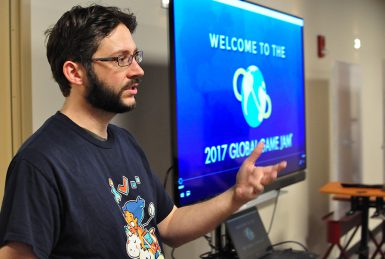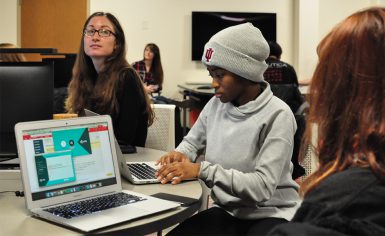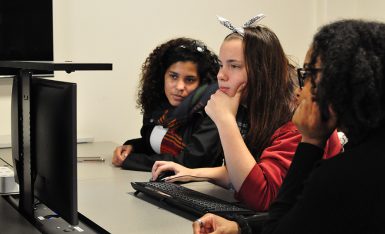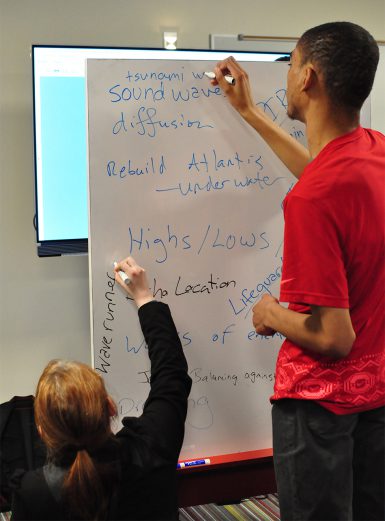Media School teams create seven games for Global Game Jam

A weekend-long span of time to create freely, learn, invent and design.
This is what the Global Gam Jam offers to thousands of game developers around the world, including 44 at The Media School Jan. 20-22.
“There are a lot of people here from outside of the game design program,” said lecturer Will Emigh, who helped organize the local jam, at the beginning of the event Friday evening. “That just goes to show how huge gaming is in our world.”
Of the attendees at the keynote Friday evening, 22 formed teams to create games, seven of which were submitted to the jam’s website at the end of the jam. While two-thirds of the participants were students, many pursuing the school’s bachelor’s degree in game design, others included a father-young-son duo spending the weekend at the jam, those hoping to turn a hobby into something more important, game lovers still learning and polished designers stretching their skills.

Around the world, 40,000 people in 600 game jams joined this weekend of invention. All participants had one common theme: waves.
As the teams in the Franklin Hall game lab brainstormed, theme ideas ranged from pirates to heat waves, from sound waves to rebuilding Atlantis to echo location. After teams agreed upon a theme, they split up and went to work designing their games and collaborating, as well as determining each person’s responsibilities for the weekend.

One team’s game revolved around the idea of a Futuristic Treasure Planet. Sports marketing major John Mason, studio arts major Kira Yelinek, game design major Alex Van Halen and informatics major Chitesh Teweni joined forces.
“This is my first time doing this specific game jam, but I’ve done others before,” Van Halen said. “The hardest part about them is that it’s never right the first time, it’s a lot of fixing scripts and stuff like that, but that’s part of the fun.”
The others were first timers who said they were excited to develop a a finished product to add to their portfolios.
In Futuristic Treasure Planet, the players are in control of driving a pirate ship through an ocean storm to get to an island. Once they are on the island, they have a set of tasks to complete in order to win the game.
The idea for the game was just a small part of the process. Yelinek was in charge of the design of the levels. She used programming software called Unity Engine for 3D and 2D Mia art design, which allowed her to create scenes from planes and make objects from those planes. Making these objects interact with one another in the game also took a great deal of programming from the other team members.
Another team’s idea for a wave-themed game was Wave Platform, where players try to get from one side of a stage to another by shooting waves to walk on and balance on as they go. The object of the game was not to all off or miss any of the waves; otherwise, you would have to start over from the beginning.

IU students Rebecca Stewart, Riley Keske and Keegan Gifford joined to create Wave Platform.
“I hope to make something that is just really cool to show people,” Gifford said. “It’s bold to think we could make a game in a weekend that someone would actually buy, but that’d be awesome if it did eventually get to that point.”
This team, like many of the others, worked through most of the night, some until 2 a.m., getting as much of the game done as they could with the limited amount of time they were given.
“I got about four hours of sleep, that’s the only time I wasn’t working on the game,” Keske said on Saturday afternoon after returning to Franklin Hall with the rest of the team. “I was up so late because when I designed the level, the person that created the script made it at an opposite 90 degree angle than I did, so we had to spend a lot of time fixing that. But that’s why communication is so important.”
The game lab in Franklin Hall was created for optimal game creating/playing. It includes dozens of controllers, white boards, computers, I-trackers and TV screens. Because the game lab is open only from noon to midnight, teams gathered outside the Media School to complete their projects.
Teams presented their finished games to the other participants Sunday evening, and the Global Game Jam organization will post the games on the website. Whether the games turned out exactly how the teams imagined or not, each team walked away from the Global Game Jam with a unique product.
More:

